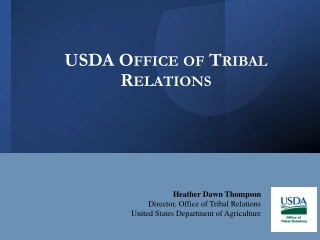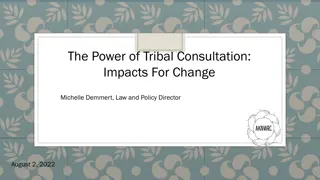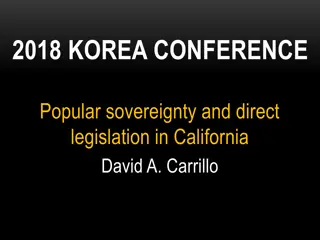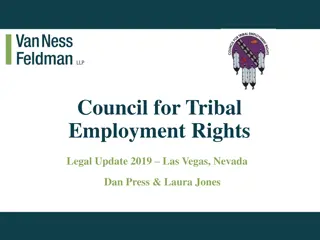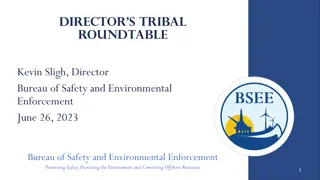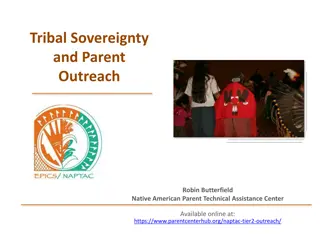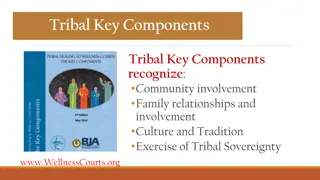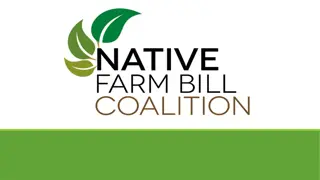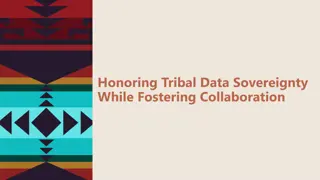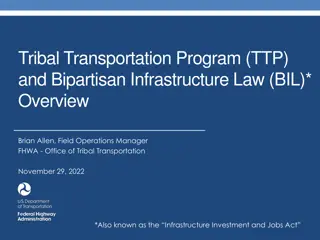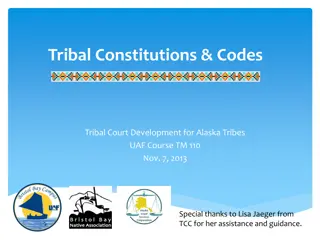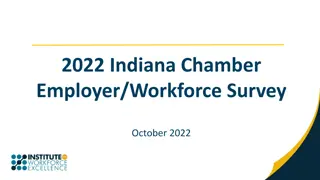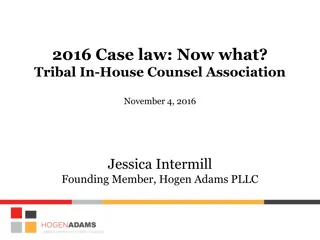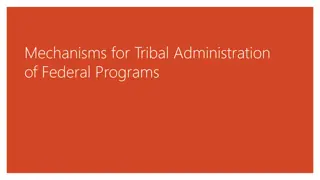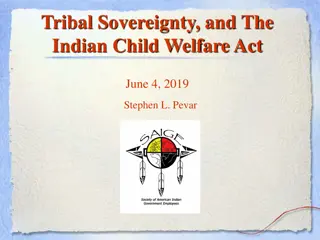Tribal Workforce Protection and Sovereignty-based Legislation
Tribal workforce protection and sovereignty-based legislation play a crucial role in safeguarding diverse workforces from discrimination, harassment, and disparate treatment. This legislation, enacted by Tribal Governments, aims to ensure equal rights and opportunities for individuals regardless of race, color, gender, sexual preference, religion, national origin, or tribal affiliation. The Tribal Workforce Protection Act addresses gaps in protection, strengthens tribal sovereignty, and reduces the likelihood of federal intrusion into employment matters. It encompasses provisions related to non-discrimination, sexual harassment, wage and hour regulations, safety measures, and family medical leave, all vital for fostering a fair and inclusive work environment within Tribal communities.
- Tribal Workforce Protection
- Sovereignty-based Legislation
- Tribal Governments
- Workplace Equality
- Tribal Sovereignty
Download Presentation

Please find below an Image/Link to download the presentation.
The content on the website is provided AS IS for your information and personal use only. It may not be sold, licensed, or shared on other websites without obtaining consent from the author. Download presentation by click this link. If you encounter any issues during the download, it is possible that the publisher has removed the file from their server.
E N D
Presentation Transcript
BASIC & ADVANCED TERO OFFICERS & COMMISSIONERS TRAINING
TERO THE EMPOWERED WARRIORS "
THE TERO ORDINANCE Will not be covered in this presentation but is the core of tribal Indian preference Law. The previous slide show s the full scope of laws TERO s tools use to protect there people
WHAT: Sovereignty-based legislation enacted by Tribal Governments to protect their diverse workforces from discrimination, harassment & disparate treatment based on race, color, gender, sexual preference, religion, national origin, or tribal affiliation.
TRIBAL WORKFORCE PROTECTION ACT WHY NEEDED: Tribes as sovereign governments are exempt from: Title VII of the 1964 Civil Rights Act Americans With Disabilities Act Equal Pay Act Americans With Disabilities Act Section 503 of the Rehabilitation Act Viet Nam Era Veterans Readjustment & Assistance Act Occupational Safety & Health Act Executive Order 11246 (Affirmative Action)
TRIBAL WORKFORCE PROTECTION ACT BEYOND PREFERENCE WHAT DOES ACT DO? Closes gaps in protection Tribal Exemptions Non-Indian Workforce It s good responsive, responsible government It strengthen and legitimizes tribal sovereignty It reduces the likelihood of federal intrusion into intramural employment matters. It reduces the likelihood of union organizing It s the right thing to do
TRIBAL WORKFORCE ACT BEYOND PREFERENCE BASIC REQUIREMENTS Preference Prohibits Discrimination (Title VII, age, sex etc.) Sexual Harassment Wage & Hour Safety (TOSA) Family Medical Leave
PART FOUR FEDERAL EMPLOYMENT LAWS
PART FOUR FEDERAL EMPLOYMENT LAW MAJOR FEDERAL LAWS THAT REQUIRE INDIAN PREFERENCE INDIAN SELF-DETERMINATION & EDUCATION ASSISTANCE ACT (PL 93-638) SECTION 7b. Preference required in: Employment; Training; Sub-contracting. * Key note: Tribal Preference OK
PART FOUR FEDERAL EMPLOYMENT LAW (CONTINUED) Enforcement Authority/Responsibility Bureau of Indian Affairs (BIA) Indian Health Service (IHS) Tribal Housing Authority (IHA) *Key Point: Tribal Preference allowed under 1990 Amendments **Ideal TERO /Agency Relationship: Collaboration
PART THREE FEDERAL EMPLOYMENT LAW NAHASDA -HUD INDIAN PREFERENCE REGS. Housing regulations 1003.510 & PL 93-638 -Section 7b Applies Preference is required in: Employment; Training; Contracting; Sub-contracting. *Enforcement: Tribal Housing Authority
MAJOR FEDERAL LAWS THAT PERMIT INDIAN PREFERENCE TITLE VII OF THE CIVIL RIGHTS ACT (1964) General Provisions: Prohibits discrimination on the basis of race, color, religion, sex or national origin. Act amended in 1978 to include the Pregnancy Discrimination Act. Coverage: All employers with 15 or more employees
TITLE VII of the Civil Rights Act (1964) COVERAGE: Key Points relative Indian Preference 703(i): Indian Preference is not race based it is based on unique status of Indian people with US GOV Permits Indian Preference - does not require Requires employer to post public announcement Does not allow Tribal Preference Law exempts Tribal governments /enterprises Enforcement : EEOC / Contracted TEROs
TITLE VII of the Civil Rights Act (1964) EEOC / TERO CONTRACTS: Government to Government agreement; Authorize TERO to take Title VII Charges; 30 days to conciliate then defer to EEOC; Fixed contracts of $25,000; Annual professional training; T/A assistance on request
TITLE VII of the Civil Rights Act (1964) SEXUAL HARASSMENT Is described as unwelcome sexual advances, requests for sexual favors, and other verbal or physical conduct of a sexual nature constitute sexual harassment when this conduct explicitly or implicitly affects an individual's employment, unreasonably interferes with an individual's work performance, or creates an intimidating, hostile, or offensive work environment.
TITLE VII of the Civil Rights Act (1964) A HOSTILE WORKPLACE ENVIRONMENT: Is described as: A workplace where an employee work performance is affected because they experience workplace harassment, unwelcome actions, offensive, and intimidating behavior and results in their dreading going to work because of the oppressive and uncomfortable atmosphere created by the harasser
TITLE VII of the Civil Rights Act (1964) GENETIC DISCRIMINATION Under Title II of GINA, it is illegal to discriminate against employees or applicants because of genetic information. Title II of GINA prohibits the use of genetic information in making employment decisions, restricts employers and other entities covered by Title II from requesting, requiring or purchasing genetic information, and strictly limits the disclosure of genetic information.
EXECUTIVE ORDER 11246 GENERAL PROVISIONS: Prohibits Discrimination Calls for Affirmative Action *INDIAN PREFERENCE UNDER EO 11246: Allows Indian Preference on or near; Prohibits Tribal Preference Defines on or near reservation Enforced by OFCCP TERO / OFCCP Relationship 37yrs MOU Partnering Relationship Provides Training T/A & Support
FHWA EMPLOYEMNT REGULATIONS & INDIAN PREFERENCE FHWA REGULATIONS 23 U.S.C. Section 140(d) Permits Indian Preference; TITLE VII-Section 703(i) Permits Indian Preference EXECUTIVE ORDER 11246 Permits IP on or near reservations. * FHWA NOTICE
GENRAL EEO/AFFIRMATIVE ACTON LAW ADA Prohibits discrimination against handicapped; FMLA-12 weeks leave for family illness; FLSA-overtime/compensatory time; ADEA- Prohibits discrimination against people 40yrs and over; EPA-must pay equal pay for equal work Davis Bacon Act-Must pay prevailing wage OSHA-protects work place safety 503 RA-Prohibits discrimination of handicapped and Require reasonable accommodation. ** TERO also uses State Employment Laws


